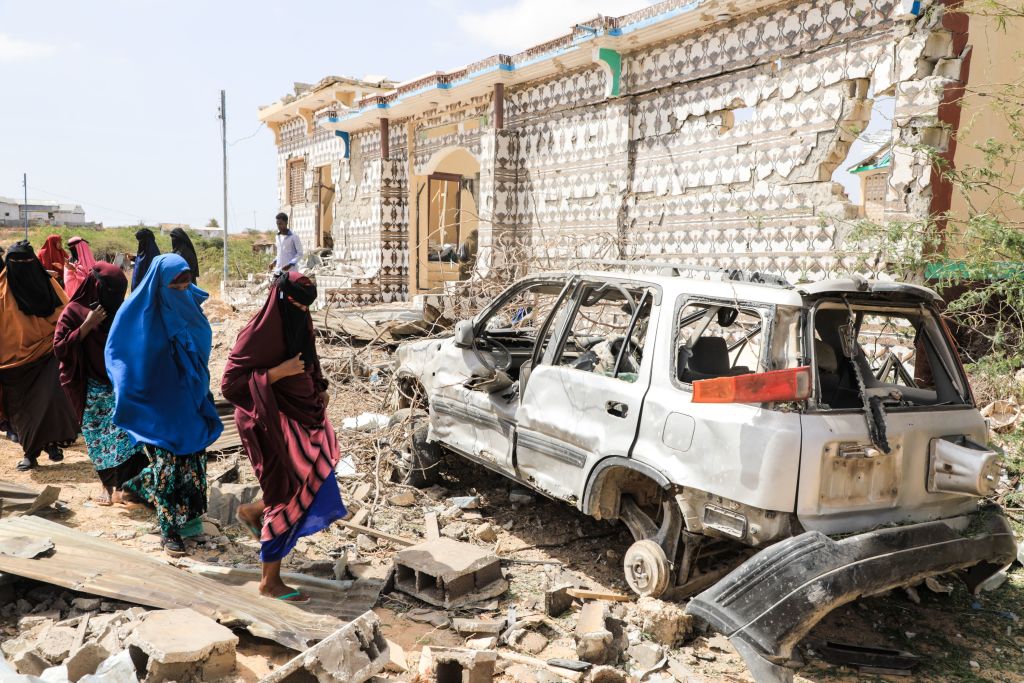ADF STAFF
Somali President Hassan Sheik Mohamud has been so focused on his rift with Ethiopia over its port deal with Somaliland that he might be leaving an opening for al-Shabaab, according to Selam Tadesse Demissie, a researcher at the Institute for Security Studies (ISS).
Ethiopia agreed in January to recognize the independence of Somaliland in exchange for the use of the Berbera port on the Gulf of Aden.
“It’s like Christmas for al-Shabaab actually,” Demissie told PassBlue, an independent news organization that covers the United Nations. “The moment you ease off in the fight against Al Shabaab, it remobilizes, it does everything that it can to come back stronger. And that is exactly where we are now.”
Somalia’s spat with Ethiopia coincides with the African Union Transition Mission in Somalia (ATMIS) troop drawdown, which will transition to a new mission, the African Union Support and Stabilization Mission in Somalia (AUSSOM), in 2025.
AUSSOM is expected to gradually hand over security responsibilities to Somali security forces and withdraw its personnel by the end of 2028.
However, recent events underscore the fears of analysts who doubt that Somalia’s security forces can contain al-Shabaab after international forces leave. The al-Qaida-affiliated terror group still controls large swathes of central and southern Somalia.
In November, an al-Shabaab attack at the Halane Base Camp in Mogadishu killed two ATMIS Soldiers and injured two others.
“The heinous attack will not deter us and the Somali security forces from pursuing lasting peace and in Somalia,” ATMIS head Mohamed El-Amine Souef said in a statement posted on the social platform X. “We reaffirm our unwavering commitment to combat terrorism and build a peaceful and prosperous Somalia.”
The previous month, a suicide bomber killed at least seven people and injured six more when he detonated an explosives-laden vest in front of a crowded Mogadishu restaurant. Among the dead was Somali comedian Sugal Abdulle and a police officer in charge of security at the Turkish-built Yardim Eli specialist hospital, Voice of America (VOA) reported.
No group claimed responsibility for the attack, but local police said it appears to be the work of al-Shabaab.
“The suicide bomber blew himself [up] in the middle of civilians and members of the police officers, staying under trees in front of the restaurant,” witness Osman Nur Aden told VOA.
A new defense pact signed by Egypt and Somalia threatens to further amplify Mogadishu’s row with Ethiopia, Corrado Čok, a visiting fellow with the European Council on Foreign Relations, recently wrote. Egypt has sent two weapons shipments into Somalia, alarming Ethiopia.
Egypt’s rivalry with Ethiopia stems from the Grand Ethiopian Renaissance Dam, a Nile River dam that threatens Egypt’s water security. The pact with Egypt also could pit Somalia’s government against its states, widening a security vacuum that al-Shabaab could exploit, according to Čok.
Somalia also does not want Ethiopia involved with AUSSOM, although Addis Ababa is the main ATMIS troop contributor. Somalia wants Egyptian troops to replace Ethiopian troops.
“If the next AU mission does not materialize, the resulting security vacuum could create the conditions for al-Shabaab to conquer key areas of the country and destabilize the entire region,” Čok wrote.
Divisions also have emerged between Somalia’s federal and state governments, as top officials from Jubaland and South West states opposed the federal government’s call for Ethiopian troops to withdraw because it would leave parts of their states unprotected.
“These intra-Somali frictions could be the final blow to the country’s state-building process, further fragmenting political and military action which al-Shabaab is set to exploit,” Čok wrote. “The risk of this could be heightened if, once deployed, Ethiopian or Egyptian troops support opposing Somali clans.”

